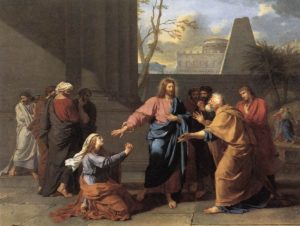Thoughts on Sunday’s Lessons for Aug. 20, 2017

La Cananéenne aux pieds de Jésus-Christ (The Woman of Canaan at the Feet of Christ, 1784), oil painting by Jean Germain Drouais (1763–1788). The Louvre, Paris.
We are approaching the midpoint of the six-month-long season of green vestments that follows Pentecost, and we see our lectionary narratives begin to turn. Our first reading marks the end of the ancestral stories of the chosen people, and our Gospel shows us Jesus and his apostles leaving Galilee on a long journey toward Jerusalem and the cross. First, Joseph: He has been through a lot since his jealous brothers sold him into slavery. He has become a chief advisor to Pharaoh, with great power over his brothers who have come to Egypt in a time of famine. In a tearful reunion, Joseph forgives them. The ancestral line that leads to the Messiah is unbroken.
First Reading (Track Two): Isaiah 56:1,6-8
Writing near the end of his long book of prophecy, when the people have returned home to Jerusalem and face the arduous task of rebuilding the city and its temple, Isaiah reminds the people that, just as they lost the land for their failure to be righteous and just, they may not keep the holy city by “maintaining justice and doing what is right.” The covenant is now for all people, for all the nations; foreigners and aliens who hold fast to the covenant will be gathered in, welcomed in the temple and made joyful.
Psalm (Track One): Psalm 133
Mirroring the joy of Joseph’s reunion with his brothers, the Psalmist celebrates the blessed state of brothers and sisters abiding together in unity. Just as Joseph’s family came back together in love, and as Paul will urge the Jewish and Pagan Christian communities in Rome to rejoin in friendship, we hear again how good and pleasant it is when families and friends live together in blessed unity.
Psalm (Track Two): Psalm 67
We hear again a Psalm that we sang this year toward the end of Eastertide, just before Pentecost. It reinforces the Isaiah reading and foreshadows Paul’s verses from Romans in its joyous call to all the nations of Earth and all their people to sing together in peace and praise. Let all the nations praise God and pray for God’s blessing, the Psalmist sings, for through God the earth gives forth its bounty, and all the earth sings out its praise.
Second Reading: Romans 11:1-2a, 29-32
Paul expands on his invitation to Rome’s Jewish and Gentile Christians to resume close relationship after the Jewish Christian community returned to Rome from exile. Here Paul emphasizes his own Jewish heritage, pointing out his status as an Israelite and a direct descendant of Abraham through Benjamin, the youngest brother whom Joseph loved. God’s promises to Israel will never be revoked, Paul declares, and God’s new promises to the Gentiles just as irrevocable. Regardless of our disobedience, our sins, and our ancestry. God is merciful to us all and loves us all.
Gospel: Matthew 15:10-28
First in today’s Gospel we encounter Jesus mocking a group of Pharisees who in previous verses had criticized his disciples for ignoring the ritual requirement to wash their hands before eating. Jesus offers an earthy response: What goes into our mouths – even food from unwashed hands – does not defile us. It’s the words that come out of our mouths that show our true character. Then, in the land of Canaan, Israel’s traditional enemy, Jesus shocks us again. When a Canaanite woman seeks help for her demon-tormented daughter, Jesus first ignores her, then replies with a startling insult, likening her children to stray dogs scrounging for crumbs under the table. But the words that then come from the mother’s mouth come from her heart. Jesus is changed by the encounter. He praises her faith and heals her child.
What are “Track 1” and “Track 2”?
During the long green season after Pentecost, there are two tracks (or strands) each week for Old Testament readings. Within each track, there is a Psalm chosen to accompany the particular lesson.
The Revised Common Lectionary allows us to make use of either of these tracks, but once a track has been selected, it should be followed through to the end of the Pentecost season, rather than jumping back and forth between the two strands.
For more information from LectionaryPage.net, click here.
